Reviews
Nick Broomfield
UK, 2007
Credits
Review by Tom Huddleston
Posted on 06 November 2007
Source Metrodome 35mm print
Categories The Times BFI 51st London Film Festival
Brian De Palma’s new film Redacted ends with a photographic montage of bloody horrors: Iraqi civilians, many of them children, the victims of grenades and gunfire, the innocent casualties of American involvement in that benighted country. At the public screening I attended, the appearance of the director’s name was the signal for a torrent of enthusiastic applause, and a cry from somewhere in the back: ‘about time!’
This applause was not for the film, but for its message. Finally, on a cinema screen, we’re seeing accurate representations of the war we see every night on our televisions. This is a war between two sides equally capable of brutality, equally fuelled by hate and racial prejudice, equally willing to view the other as monstrous and animal. Because in Hollywood the Iraq war, just like Vietnam before it, has become something else, a place where tortured heroes endure baptisms of fire, where brave (if often misguided) servicemen learn lessons about life and the world, often through violent clashes with faceless, brown skinned, babble-speaking hordes.
One of the few issues that seems to unite the religious right and liberal left in American politics and society is their support for the troops. However corrupt and misguided the politicians may become, however desperate and devious the generals, it’s generally accepted that the American fighting man is a hero, struggling bravely for his country, or his family, or for Freedom. Filmmakers like Robert Redford, liberal comedians like John Stewart may blame the White House, blame the officers, blame the system itself, but they never, ever blame the grunts. Even in the wake of Abu Ghraib and Haditha, even when all the evidence points to the contrary, this perception persists.
So is America ready for Redacted and Battle For Haditha, two films which attempt to depict a darker side of America’s brave fighting men? Are they ready for films which show American troops as sadists, as murderers, as rapists and torturers, as frustrated and helpless children lashing out at anyone within range? The rest of the world seems more than ready, crying out for a representation of the American soldier as something other than hero or victim, or both1. But in a country where even the anti-war demonstrators claim they’re marching in support of their boys, can these films find a sympathetic audience, or even a distributor?
Redacted is the higher profile of the two, directed by a Hollywood A-lister (when he wants to be) striving hard for relevance and impact, at the expense of subtlety, character and perhaps posterity. This is an angry and immediate film, scattershot and diffuse, the cinematic equivalent of a hastily written protest song that doesn’t quite rhyme, but gets its point across nonetheless. It’d be hard to argue for Redacted on the strength of its cinematic merits, but it is an involving, ultimately affecting piece of work.
Constructed entirely from faked snippets of video diaries, news reports, Youtube postings and documentary footage, the film follows four American soldiers stationed at a busy vehicle checkpoint in a mid-sized Iraqi town. War, for them, involves a lot of waiting around and inspecting vehicles, arguing amongst themselves and shooting mistrustful glances at the local populace, all of whom are suspected insurgents. Two of these characters - Salazar, the video diarist, and McCoy, a budding lawyer - are clearly ‘thinkers,’ uncertain about their position, questioning of authority. The other two - rookie Flake and bullheaded Rush - are more in the moment, filled with a poisonous hatred for their faceless, unpredictable enemy. So when the platoon sergeant is killed by a hidden bomb, Flake and Rush decide to take matters into their own hands, exacting revenge against the population by brutally raping a 14-year-old girl and murdering her family. And while Salazar, in the interest of truth, documents the event, McCoy stands outside on guard, sickened but unwilling or unable to act.
From this brief synopsis, it should be clear what Redacted’s biggest influence is, at least from a dramatic standpoint: this is essentially a remake of De Palma’s own Casualties Of War, a more elegiac, traditional take on similar themes. But there are no stars here, no sweeping score, no elegant cinematography. This is an ongoing war, these events are still happening, and a more modern, explosive approach is required.
There are moments in Redacted where the director comes off like an ageing hipster trying desperately to get down with the kids, struggling so hard for relevance and contemporaneity that it all feels a bit desperate. The actors are by no means bad, but it’s hard to take this kind of naturalistic, expletive-filled banter for a full 90 minutes, never mind the constant shakycam and concurrent dialogue. Still, the video diary technique certainly has the effect of throwing us into the soldiers’ world, and not for a moment does the film feel fake.
And the fact is that, for better or worse, Redacted isn’t really trying to be a film in the classic sense—De Palma isn’t particularly interested in character, or plot, or the look of the film. He wants emotional and political impact, and on this level, if on no other, the film succeeds. A grinding sense of impending catastrophe is introduced early, and superbly maintained through the Sergeant’s murder up to the climactic event. The attack itself is brutal but never gratuitous, impactful without having to spray the screen with blood and innards. Redacted suffers, like much of De Palma’s work, from a chronic lack of subtlety. It’s loud, nasty, furious, and almost as dumb as the Marines it portrays. Critical response, at least from the American side, has been excessively vituperative, though most critics have reacted harshly to the film’s aesthetic qualities (or lack of same), rather than its message. Still, there is a feeling that this is the work that could wreck De Palma’s career, a fact he must have known going in. And so, however messy and overblown, however temporary its effect, the fact remains that this is a brave and arguably necessary film, an important statement at an opportune time, because at the moment this part of the Iraq debate hasn’t even begun.
Nick Broomfield’s Battle For Haditha is a much more even handed piece of work. The two films share a certain amount, both aesthetically and textually: both concern atrocities performed by American Marines, both tell their stories in semi-documentary style complete with to-camera interviews and shaky, on-the-move action sequences. Both are angry and questioning about the reasons for war, and the direction things are heading. But Broomfield’s film is more considered, more sympathetic, less enraged but ultimately more powerful.
The Haditha Massacre is already the most notorious single event of the conflict so far, referred to in the press as ‘Iraq’s My Lai.’ On November 19th 2005, a roadside bomb overturned an American humvee, killing one soldier and severely injuring two others. In retaliation, the surviving Marines killed five passengers from a passing car, then moved to a nearby housing complex where they proceeded to murder nineteen more civilians, many of them children. Broomfield’s take on the incident is derived from extensive witness testimony, army and news reports and contemporary video footage shot by a local teenager. It was filmed in Jordan, and cast largely from Iraqi refugees and actual American ex-servicemen. The narrative focuses on three sets of characters: the marines, led by Col. Ramirez, who would ultimately carry out the massacre; the bombers, a pair of local workers paid by an insurgent gang; and the victims, a group of interconnected families living near to the bombing site.
Another widely held, if largely unacknowledged perception in Western society is that an Iraqi life is worth less than that of an American, or a Brit, or any other ‘coalition’ soldier. Part of this is self protection; it’s easier to live with (and ignore) the horror of this war if you believe that only about 4,000 people have died, as opposed to hundreds of thousands. Another aspect of it has to do with cultural difference and ingrained, low level racism: 2nd World War memoirs are filled with guilty reminiscences, of the author staring down at his latest kill and realising he was just a boy like him. We don’t hear those kinds of stories from Iraq, just as we didn’t from Vietnam—these people are too different, in skin colour and language and religion and way of life, in the way they express themselves and their emotions.
But perhaps the most pervasive influence here is the media: we, the war’s ‘audience,’ know very little about Iraqi lives, but plenty about American ones. We know about the soldiers’ backgrounds, their interests, their family lives. Whether they are poor urban or rural kids, ex-gang members, high school jocks or blue blooded officers, we know these characters, from a century of movies, and TV shows. So even when they act in brutal, unforgivable ways, we automatically search for the real reasons behind it, the poverty stricken childhood, the lack of education, the brutalised upbringing. Only the enemy is ever allowed to be just plain evil.
Watching Battle For Haditha, it becomes painfully aware how little the mainstream media lets us know about Iraqi culture. Of the brace of films made so far about the conflict, Broomfield’s is the first to pay more than lip service to the civilian population, viewing them as more than just victims or Jihadis, but real, living characters. Broomfield knows that for his film to have the impact it deserves the audience needs to relate to the characters, both killers and casualties.
At the centre of the latter group are Hiba and Rashied, a married couple still very much in love, expecting their first child. Their relationship is so sweetly played, so hopeful and incongruous amid the rattle of gunfire and the widespread desolation, that they act as our emotional window into this unfamiliar world. It is their story, and their suffering, that affects us more than any other.
Within the Marine platoon our focus of sympathy is Ramirez, superbly played by celebrity soldier Elliot Ruiz, already the star of a recent documentary about his experiences in combat. Ramirez is affected by all he’s seen, plagued by nightmares and riddled with doubt. But all this is swept away when the killing starts—Ramirez single handedly initiates the massacre, murdering 13 civilians. And yet, somehow, Broomfield manages to keep him as something other than a monster, as a conflicted, self hating human being on his way to becoming a machine, struggling against it, hating everything this war is turning him into.
At no point does Battle For Haditha take the easy or obvious option, every character and every situation is shown to be nuanced, complex, two-sided. Nowhere is this clearer than in the treatment of the insurgents. The central pair, shabby, disgruntled Jafar and young, idealistic Ahmad, are also superbly rounded characters, and perhaps even victims themselves: of American intervention, of financial desperation, of insurgent blackmail. But it is in the aftermath of the massacre that Broomfield shows us the insurgents’ true objectives—not just killing Americans, but forcing retaliation, allowing the martyrdom of their own people just to give the American military a black eye. Even the video footage that sparked the initial investigation is shown to be untrustworthy—after one girl recounts the murder of her whole family, an insurgent cameraman urges her to “tell them the Americans knocked you down and beat you.”
Stylistically, Battle For Haditha is strongly reminiscent of Broomfield’s magnificent Ghosts, using non-actors to play versions of themselves, shooting in locations as close to the source as possible, utilising the techniques of documentary to enhance an essentially fictional reconstruction. Disappointingly, there’s none of the spectral beauty of the earlier film here, with the exception of some striking desert photography. But, like Redacted, Battle For Haditha is not a film that demands visual distinction, but dramatic integrity, and attention to detail, both of which are present and correct.
The impact of these two films remains to be seen—it’s unlikely either will screen widely, or meet with any kind of quantifiable commercial success. Which is a shame, because in their absence the only depiction of American intervention overseas will be, for the moment, the mainstream news networks and films like Lions for Lambs, both of which are so careful not to offend anyone that they seem to evade reality altogether. These films, flawed as they undoubtedly are, show us a side of the ongoing conflict which feels genuine: Redacted attempts to give us a window into the psyche of the average American soldier, while Battle For Haditha depicts Iraq not as a testing ground or a vision of hell, but as an ordinary place filled with ordinary people, suffering under extraordinary conditions. And both films, in their way, attempt to find some semblance of truth amid all the propaganda, heated emotion and steadily progressing insanity of this messy, brutal conflict.
More The Times BFI 51st London Film Festival
-
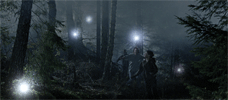
Island of Lost Souls
2007 -

Garage
2007 -

Exodus
2007 -
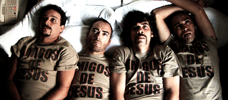
Friends of Jesus
2007 -

We Want Roses Too
2007 -
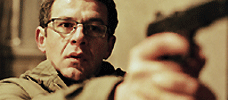
The Trap
2006 -

Captain Ahab
2007 -

Shotgun Stories
2007 -

Savage Grace
2007 -
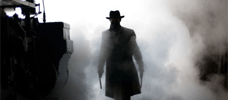
The Assassination of Jesse James by the Coward Robert Ford
2007 -

The World Unseen
2007 -

Things We Lost In The Fire
2007 -

Lions for Lambs
2007 -

Talk to Me
2007 -
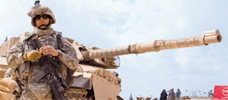
Redacted
2007 -
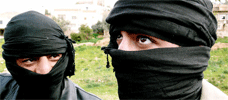
Battle For Haditha
2007 -

Chaotic Ana
2007 -

Angel
2007 -

Juno
2007 -

Fay Grim
2006 -

Reservation Road
2007 -
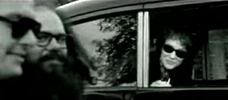
I’m Not There
2007
We don’t do comments anymore, but you may contact us here or find us on Twitter or Facebook.



